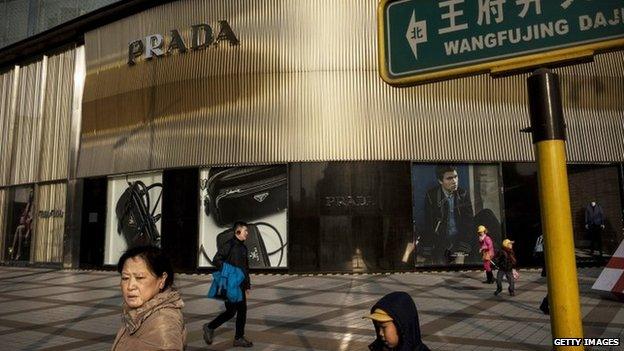China’s noblesse oblige
- Published
- comments

Are China's new super-rich resented by its new middle class?
A record 290 new billionaires have joined the ranks of the richest in the world, leading the Forbes rich list to register a record 1,826 of the wealthiest people in the world.
Of these, a quarter of the newcomers were from China and a record number of young billionaires were added (46 billionaires are under the age of 40).
They are predominately in the tech sphere, which produced not only wealth for the under-40s, but also propelled Alibaba's Jack Ma to rank as China's second richest man after his e-commerce firm's record IPO.
But it was the continued reign at the top of the list by Wang Jianlin, who retained the title of China's richest man, that signalled that in China, the most money is still made through the traditional industries of property and entertainment.
I sat down with Wang Jianlin for an exclusive broadcast interview in Shanghai. I asked him about whether there was resentment against the rapid increase of the number of the super-rich in China.
He believed that there was, and that it wasn't specific to China. He observed that as societies become middle-class, their resentment against the rich increases. When places such as Singapore and Hong Kong were poorer, he thought that there weren't such attitudes and that it changed as these societies became better off.
Wang Jianlin's observation echoes the studies that find that inequality and poverty are relative concepts.
It's not just the absolute difference between the incomes of the rich and the poor that matters for well-being. That's what's typically measured by indicators such as the Gini coefficient. But especially as a society becomes dominated by the middle class, comparisons are relative.
For instance, it is your income relative to the median income that defines poverty in developed economies. By that gauge, more than a million pensioners are poor in the UK when measured as those living on less than 60% of the median income (disposable income minus housing costs).
For China, this shifting societal perception follows from its own transformation into a middle-class society in the past decade. It was only in 2002 that average incomes in China exceeded those of the poorest countries in the world and rose to above $1,000 per head per year.
It was only a few years ago, in 2008, when China joined the ranks of middle-class countries, as average incomes surpassed $3,000. Even now, with average incomes about $7,000, China ranks only in the top 90 countries when measured by average incomes, so just in the top half of all countries in the world.
But, of course, the average obscures distribution and China is an unequal society. A Peking University study found the top 5% earned nearly a quarter of all household income in 2012.
Most studies find a large gap between urban and rural areas in the order of urban households earning three times that of rural ones, which is high by international standards. The coast also outpaces the interior in terms of wealth. All of which adds up to a society that confronts various dimensions of inequality and in such a short period of time.
The most public cases of wealth inequality now place the spotlight on the second generation of the rich. It's not only the so-called princelings, whose parents are Communist Party officials, that are attracting attention. It's also the "fuerdai" or rich second generation, like Wang Jianlin's son who has attracted attention for his outspoken microblog on Weibo, where his lifestyle and preferences are revealed.
There is a stark contrast between the generation that endured through the Cultural Revolution and emerged as entrepreneurs in the late 1980s/early 1990s, when China first liberalised markets, and the more recent tech pioneers who took advantage of the even greater opening of China in the 2000s.
More than half of China's wealthy are entrepreneurs; the rest are investors and a small number of highly paid executives. There is little inherited wealth, because of the dismantling of the social structure under communism. So these are largely self-made men (they are mainly men, like most of the super-rich around the world).
Wang Jianlin recalls a time when they were role models for others who sought to work hard and follow in their footsteps. Still now, cameras flash when Wang steps out of his Rolls-Royce limousine.
But, when I asked him about whether he's concerned about the work ethic of the next generation following the public criticisms of his son, he said that he was.
And coming back to the growing resentment against the rich, he believes that China needs entrepreneurs and private firms to succeed. But he also thinks that the rich should lead philanthropic efforts and give back to society. China's philanthropic efforts lag and were described by Bill Gates, external as "not there yet".
One gauge, the World Giving Index of the Charities Aid Foundation, sees improvement in China, as philanthropic efforts in recent years have risen.
Some have been led by high-profile people such as Yang Lan, known as China's Oprah for her fame as a TV host and ownership of a leading media company. Still, China ranks 128th out of 135 countries, external in terms of giving money and other charitable activities.
I'll have more on my interview with Wang Jianlin next week on Talking Business and China's Route to Riches.
For now, it's worth recalling when Deng Xiaoping launched market-oriented reforms in China, he said some should get rich first. It may be time now for the rich to give some of that back to society.